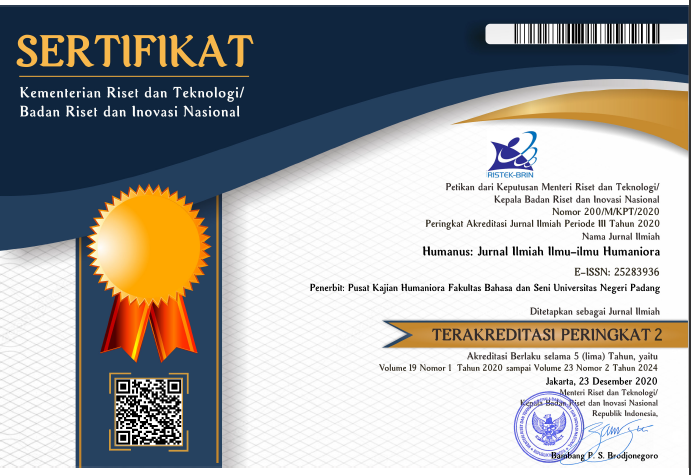Feminist Discussions on The Remembrance of Earth’s Past Trilogy
 ),
), (1) Department of Languages, Cultures and Film University of Liverpool
 Corresponding Author
Corresponding Author
Copyright (c) 2021 Humanus
DOI : https://doi.org/10.24036/humanus.v20i2.113795
Full Text:
 Language : en
Language : en
Abstract
As the first Asian Hugo Award laureate, Liu Cixin is an illustrious science-fiction writer in China, whose chef-d’oeuvre is an award-winning trilogy entitled Remembrance of Earth’s Past, or more widely renowned by the title of its first volume, viz. The Three-Body Problem. The series not only features intercivilisational belligerence via a fecundity of imagination and richness of imagery-evoking representation, but also manifests humanity and benevolence, so it has attained a loyal readership and commercial success. Notwithstanding critical acclamation, this male-authored trilogy encounters contentiousness concerning gender discrimination. I propound that the Remembrance of Earth’s Past series does not exhibit sexism, though there are depictions with gender stereotypes.
Keywords
References
Alexander, N. (2015). Hell is Other People: The Dark Forest by Cixin Liu. Tor.com. 11 August 2015. https://www.tor.com/2015/08/11/hell-is-other-people-the-dark-forest-by-cixin-liu/.
Alter, A. (2019). Why Is Chinese Sci-Fi Everywhere Now? Ken Liu Knows. New York Times. 06 December 2019. https://cn.nytimes.com/culture/20191206/ken-liu-three-body-problem-chinese-science-fiction/dual/.
Büchenbacher, K. (2018). China’s meat divide. Global Times. 19 July 2018. https://www.globaltimes.cn/content/1111499.shtml.
China Daily. (2015). China’s Arthur C. Clarke. China Daily. 24 August 2015. https://language.chinadaily.com.cn/2015-08/24/content_21688078_2.htm.
China Daily. (2019). Liu Cixin. China Daily. 18 April 2019. http://shanxi.chinadaily.com.cn/yangquan/2019-04/18/c_356401.htm.
China Writer. (2011a). 三体Santi [The three-body problem]. China Writer. 04 November 2011. http://www.chinawriter.com.cn/2011/2011-11-04/104315.html.
China Writer. (2011b). 刘慈欣 Liu Cixin [Liu Cixin]. China Writer. 04 November 2011. http://www.chinawriter.com.cn/2011/2011-11-04/104314.html.
China Writer. (2015).《三体》英文版 Santi yingwenban [The English version of The three-body problem]. China Writer. 25 August 2015. http://www.chinawriter.com.cn/2015/2015-08-25/251653.html.
Donawerth, J. (1990). Utopian Science: Contemporary Feminist Science Theory and Science Fiction by Women. NWSA Journal, 2.4, 535-557.
Donawerth, J. (2013). Katherine MacLean’s Short Science Fiction and Cytology: Science as Parabola. In B. Attebery & V. Hollinger (Ed.) Parabolas of Science Fiction (pp. 53-69). Middletown, CT: Wesleyan University Press.
Dwyer, C. (2018). Once ‘Ball Lightning’ Gets Rolling, This Sci-Fi Mind-Bender Shines. NPR. 19 August 2018. https://www.npr.org/2018/08/19/636214212/once-ball-lightning-gets-rolling-this-sci-fi-mind-bender-shines?t=1627923852810.
Fan, J. (2019). Liu Cixin’s War of the Worlds: A leading sci-fi writer takes stock of China’s global rise. The New Yorker. 17 June 2019. https://www.newyorker.com/magazine/2019/06/24/liu-cixins-war-of-the-worlds.
Fang, X. (2016). 试析《三体》中三位女性形象的伦理意义 Shixi Santi zhong sanwei nvxing xingxiangde lunli yiyi [Analysing the ethical meaning of three female characters in The three-body problem]. Literature Education, 09.
Gao, F. (2015). 三体为什么这样红? Santi weishenme zheyang hong? [Why is The three-body problem so popular?]. China Writer. 25 August 2015. http://www.chinawriter.com.cn/kehuan/2015/2015-08-25/251655.html.
Gao, H. (2019). ‘Little Fresh Meat’ and the Changing Face of Masculinity in China. The New York Times. 12 June 2019. https://www.nytimes.com/2019/06/12/opinion/little-fresh-meat-china.html.
Glinter, E. (2016). Review: China’s most popular science fiction writer, Cixin Liu, brings his spectacular trilogy to an end. Los Angeles Times. 22 September 2016. https://www.latimes.com/books/la-ca-jc-cixin-liu-20160914-snap-story.html.
Global Times. (2015). The future of Chinese sci-fi: An interview with China’s first Hugo Award winner: Liu Cixin. Global Times. 30 August 2015. https://www.globaltimes.cn/content/939761.shtml.
Guo, S. & C. Basu. (2010). Writing in the future perfect. China Daily. 17 December 2010. https://www.chinadaily.com.cn/life/2010-12/17/content_11716709.htm.
Han, S. (2012). 人类应该向刘慈欣致敬——《三体2: 黑暗森林》读后 Renlei yinggai xiang Liu Cixin zhijing—Santi 2: Heian senlin duhou [Humans should salute Liu Cixin for his The three-body problem 2: The dark forest]. China Writer. 01 February 2012. http://www.chinawriter.com.cn/2012/2012-02-01/114569.html.
Helford, E. R. (2005). Feminism. In The Greenwood Encyclopedia of Science Fiction and Fantasy: Themes, Works, and Wonders, ed. Gary
Westfahl, 289-291. Westport, Connecticut: Greenwood Press.
Hinsch, B. (2013). Masculinities in Chinese History. Plymouth: Rowman & Littlefield Publishers.
Hu, C. (2017). Deciphering ‘Nan Se consumption’ under consumerist culture. Journal of News Research, 8.22, 83-86.
Hu, P. (2015). 从《三体》看科幻魅力 Cong Santi kan kehuan meili [The charm of science-fiction reflected by The three-body problem]. Guangming Daily. 07 September 2015. https://epaper.gmw.cn/gmrb/html/2015-09/07/nw.D110000gmrb_20150907_1-13.htm?div=-1.
Huang, Y. (2011). 每一个文明都是带枪的猎手——专访科幻作家刘慈欣 Meiyige wenming doushi daiqiangde lieshou—Zhuanfang kehuan zuojia Liu Cixin [Every civilisation is a hunter with a gun—An interview with the science-fiction writer Liu Cixin]. Southern Weekly. 26 April 2011. http://www.infzm.com/content/58004.
John A. (2013). Science Fiction’s Sexism Problem. The Atlantic. 08 August 2013. https://www.theatlantic.com/culture/archive/2013/08/speculative-fiction-has-sexism-problem/312355/.
Jung, S. (2009). The Shared Imagination of Bishonen, Pan-East Asian Soft Masculinity. Intersections: Gender and Sexuality in Asia and the
Pacific 20. http://intersections.anu.edu.au/issue20/jung.htm.
Jung, S. (2011). Korean masculinities and transcultural consumption: Yonsama, Rain, Oldboy, K-pop idols. Hong Kong: Hong Kong University Press.
Keengan, M. (2018). Can China’s ‘Little Fresh Meat’ Deliver Big Brand Results? Jing Daily. 31 October 2018. https://jingdaily.com/little-fresh-meat-deliver-results/.
Leung, L. (2017). Liu Cixin: A star in Chinese science fiction. In Contemporary Chinese Fiction Writers: Biography, Bibliography, and Critical Assessment. New York: Routledge.
Li, B. (2015). 为什么刘慈欣的《三体》走红互联网圈? Weishenme Liu Cixin de Santi zouhong hulianwang quan [Why is Liu Cixin’s The three-body problem popular in the cyberspace?]. China Writer. 25 August 2015. http://www.chinawriter.com.cn/kehuan/2015/2015-08-25/251658.html.
Li, W. (2015). 中国科幻作家刘慈欣凭《三体》获雨果奖Zhonguo kehuan zuojia Liu Cixin ping Santi huo yuguojiang [A Chinese science-fiction writer Liu Cixin won a Hugo Award with The three-body problem]. BBC News. 23 August 2015. https://www.bbc.com/zhongwen/simp/china/2015/08/150823_china_book_prize.
Li, X. (2020). How powerful is the female gaze? The implication of using male celebrities for promoting female cosmetics in China. Global Media and China, 5.1, 55-68.
Lin, P. J. (1977). A Translation of Lao-tzu’s Tao Te Ching and Wang Pi’s Commentary. Ann Arbor: University of Michigan Press.
Liu, B. (2015). 《三体》现象与中国科幻 Santi xianxiang yu zhongguo kehuan [The three-body problem phenomenon and Chinese science fiction]. China Writer. 08 September 2015. http://www.chinawriter.com.cn/kehuan/2015/2015-09-08/252784.html.
Liu, C. (2014). The Three-Body Problem. Trans. Ken Liu. London: Head of Zeus.
Liu, C. (2015). The Dark Forest. Trans. Joel Martinsen. London: Head of Zeus.
Liu, C. (2016). Death’s End. Trans. Ken Liu. London: Head of Zeus.
Liu, S. (2015). 刘慈欣的硬科幻, 硬在哪里? Liu Cixin de yingkeji, yingzai nali? [Why is Liu Cixin’s science fiction called hard?]. China Writer. 25 August 2015. http://www.chinawriter.com.cn/kehuan/2015/2015-08-25/251670.html.
Louie, K. (2000). Constructing Chinese Masculinity for the Modern World: with Particular Reference to Lao She’s The Two Mas. China Quarterly, 164, 1062-1078.
Louie, K. (2002). Theorising Chinese masculinity: Society and gender in China. Cambridge, UK: Cambridge University Press.
Louie, K. (2012). Popular culture and masculinity ideals in East Asia, with special reference to China. The Journal of Asian Studies, 71.4, 929-943.
Luo, W. (2017). Television’s ‘leftover’ bachelors and hegemonic masculinity in postsocialist China. Women’s Studies in Communication, 40.2, 190-211.
Ma, Y. (2019).《三体》怎么拍书迷都很难满意 Santi zenmepai shumi dou hennan manyi [It is difficult to adapt The three-body problem into film]. Yangtse Evening Post. 26 June 2019. http://www.xinhuanet.com/book/2019-06/26/c_1210168968.htm.
Martin, G. R. R. (2015). Reading for Hugos. Livejournal. 03 May 2015. https://grrm.livejournal.com/426205.html.
Merrick, H. (2000). ‘Fantastic Dialogues’: Critical Stories about Feminism and Science Fiction. In A. Sawyer & D. Seed (Ed.) Speaking science fiction: Dialogues and interpretations (pp. 52-68). Liverpool: Liverpool University Press.
Morning Press. (2014). 名词解释: 小鲜肉 Mingci jieshi: Xiaoxianrou [Neologism definition: Little fresh meat]. Morning Press. 19 Septemberhttps://web.archive.org/web/20170908124613/http://news.163.com/14/0919/07/A6G6HN2800014AED.html.
Qian, Y. (2015). 刘慈欣: 雨果奖是我和译者刘宇昆共同得的 Liu Cixin: Yuguojiang shi wo he yizhe Liu Yukun gongtong dede [Liu Cixin: I won the Hugo Award together with my translator Liu Yukun]. Legal Evening News. 20 April 2015. http://www.chinanews.com/cul/2015/08-24/7485940.shtml.
Richardson, N. (2018). Even what doesn’t happen is epic. London Review of Books 40.3. 08 February 2018. https://www.lrb.co.uk/the-paper/v40/n03/nick-richardson/even-what-doesn-t-happen-is-epic.
Roberts, A. (2016). The History of Science Fiction. London: Palgrave Macmillan.
Rosser, S. (2000). Women, Science, and Society: The Crucial Union. New York: Teachers College Press of Columbia University.
Russ, J. (1971/2017). The Image of Women in Science Fiction. In Science Fiction Criticism: An Anthology of Essential Writings, ed. Rob
Latham, 200-210. London and New York: Bloomsbury.
Ruan, F. (2015). Hugo Award winner: I’m just writing for the beer money. The Telegraph. 31 August 2015. https://www.telegraph.co.uk/sponsored/china-watch/culture/11834788/santi-trilogy-author-liu-cixin-hugo-award.html.
Shanxi Evening Newspaper. (2015). 刘慈欣: 全中国能养活自己的科幻作家不超过3个 Liu Cixin: Quan zhongguo neng yanhuo zijide kehuan zuojia bu chaoguo sange [Liu Cixin: There are less than three science-fiction writers in China who can support themselves]. Shanxi Evening Newspaper. 11 September 2015. http://www.chinanews.com/cul/2015/09-11/7518119.shtml.
Shi, J. (2015). 刘慈欣《三体2》美国版遭遇女权主义编辑, 修改多达一千多处 Liu Cixin Santi 2 meiguoban zaoyu nvquan zhiyi bianji, xiugai duoda yiqianduochu [The American version of Liu Cixin’s The three-body problem 2 has a feminist editor; there are over 1000 revisions]. The Paper. 20 April 2015. https://www.thepaper.cn/newsDetail_forward_1322734.
Si, Y. (2019).《流浪地球》引热议, 中国式科幻全方位解读 [The Wandering Earth triggers discussion: An interpretation of the Chinese-style science fiction]. BBC News. 15 February 2019. https://www.bbc.com/zhongwen/simp/chinese-news-47236820.
Song, G. & D. Hird. (2013). Men and masculinities in contemporary China. Leiden: Brill.
Teng, C. (2019). 宁浩: 不同意今年 “科幻元年” 这个说法 Ning Hao: Butongyi jinnia ‘kehuan yuannian’ zhege shuofa [Ning Hao: This is not the ‘year of science fiction’]. The Beijing News. 15 December 2019. http://www.xinhuanet.com/ent/2019-02/15/c_1124117623.htm.
Tong, X. (2019).《三体》中的道德困境 Santi zhongde daode kunjing [Moral dilemma in The three-body problem]. Shen Hua 09: 65-66.
Valtonen, M. & H. Karttunen. (2005). The Three-Body Problem. Cambridge: Cambridge University Press.
Walter, D. (2013). Science fiction’s invisible women. The Guardian. 08 August 2013. https://www.theguardian.com/books/booksblog/2013/aug/08/science-fiction-invisible-women-recognition-status.
Wang, Y. (2017). Nan Se consumption in entertainment era: A criticism of ‘little fresh meat’. Shanghai Artists, 3, 56-60.
Wu, H. (2016). How ‘Little Fresh Meats’ Are Winning China Over. Sixth Tone. 17 August 2016. https://www.sixthtone.com/news/1201/how-little-fresh-meats-are-winning-china-over.
Xu, Y. & W. Wang. (2017). 香中别有韵 静待百花开——论刘慈欣《三体》系列小说 Xiangzhong bie youyun jingdai baihuakai—Lun Liu Cixin Santi xilie xiaoshuo [A Unique Charming in Fragrance,a Quiet Wait for Flowers Blossoming——A Narrative Comment on The Three-Body by Liu Cixin]. Studies on Science Popularization, 05.
Yang, D. & D. Wang. (2019). 刘慈欣成 “银河科幻名人堂” 首位入选者 Liu Cixin cheng ‘Yinhe kehuan mingrentang’ shouwei ruxuanzhe [Liu Cixin became the first winner of ‘Galaxy science fiction hall of fame’]. Xinhua News. 25 November 2019. http://www.xinhuanet.com/book/2019-11/25/c_138581365.htm.
Yaszek, L. (2007). Galactic Suburbia: Recovering Women’s Science Fiction. Columbus: Ohio State University Press.
Zhang, J. (2016).《三体》《北京折叠》译者刘宇昆: 两次获得 “雨果奖” Santi Beijing zhedie yizhe Liu Yukun: Liangci huode Yuguojiang [The translator of The three-body problem and Folding Beijing: Liu Yukun has won Hugo Award twice]. Huaxi Dushi Bao. 31 August 2016. http://culture.people.com.cn/n1/2016/0831/c22219-28679601.html.
Zhang, Q. & K. Negus. (2020). East Asian pop music idol production and the emergence of data fandom in China. International Journal of Cultural Studies, 23.4, 493-511.
Zhang, Y. (2015). US publisher edits translated sci-fi novel for ‘gender discrimination’. Global Times. 21 April 2015. https://www.globaltimes.cn/content/917836.shtml.
Zhou, C. (2017). ‘Nan Se consumption’: Cultural analysis of advertisements featuring male celebrities for female cosmetics. Culture & Communication, 6.1, 1-5.
 Article Metrics
Article Metrics
 Abstract Views : 1950 times
Abstract Views : 1950 times
 PDF Downloaded : 432 times
PDF Downloaded : 432 times
Refbacks
- There are currently no refbacks.
Copyright (c) 2021 Humanus

This work is licensed under a Creative Commons Attribution-NonCommercial 4.0 International License.











